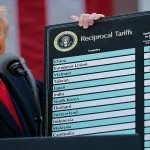
(NEW YORK) — U.S. consumers are going on a tariff-induced shopping spree. From furniture, to appliances, to alcohol, Americans are rushing to buy before President Donald Trump’s sweeping tariffs are felt at the checkout counter.
Economists say the tariffs are expected to increase prices for everyday items and many are now raising the likelihood that the economy will fall into a recession.
Auto sales surged 11.2% in March as car buyers flocked to dealerships to beat the 25% tariffs on all imported cars, which went into effect April 3.
Once Noel Peguero heard about the wider tariff announcements, he said he hit the stores. The 50-year old school worker from Queens, New York, says he spent about $3,500 this past week on car parts, gardening supplies and electronics, including a 40″ Hisense television and Macbook laptop for his son.
“Now is the time to buy,” he told ABC News, adding they were items he was planning to purchase anyway but decided to buy sooner rather than later to avoid any potential price increases.
While stocking up on some items now may make sense, experts caution consumers to buy only what they can afford and not go into debt to get ahead of the “tariff effect.”
“A lot of people are dealing with diminished savings and rising debt, so they may not be in a position to make a big purchase or put together a large stockpile,” Ted Rossman, a senior industry analyst at Bankrate, tells ABC News. “Take the long view. It might make more sense to drive your existing car for a bit longer or live with the old kitchen cabinets another year or two.”
With nearly all U.S. trading partners now subject to a 10% tariff and even higher “reciprocal tariffs” to come April 9 for about 60 trading partners that have a high trade deficit with the United States, some consumers worry that everyday items may soon not only be more expensive, but harder to find.
The mere thought conjures images of empty store shelves during the height of the COVID-19 pandemic, when Americans were scrambling for everything from toilet paper to baking flour.
Billionaire entrepreneur Mark Cuban added to those worries this week, posting on the social-media platform BlueSky that people should “buy lots of consumables” now before prices go up.
“From toothpaste to soap, anything you can find storage space for, buy before they have to replenish inventory,” Cuban said. “Even if it’s made in the USA, they will jack up the price and blame it on tariffs.”
Experts say they don’t anticipate any shortages.
“Of course, if everyone heeded [Cuban’s] advice, there probably would be some issues, but we’re not seeing evidence this is happening at scale,” Rossman said. “Thankfully the supply chain is in much better shape than it was during the pandemic.”
With the average American household carrying about $6,600 in debt, according to TransUnion, experts say it’s important to take a measured approach and consider your long-term financial situation and goals.
“I realize sometimes people need to carry debt for various reasons,” said Rossman, “but don’t make it worse by panic buying. Rushing to make a big purchase often doesn’t end well.”
Copyright © 2025, ABC Audio. All rights reserved.
